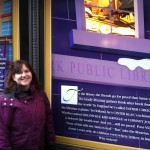by Jennifer Reisch, Senior Assistant, INALJ NYC
Jill Abramson Hates Censorship (and So Do I!)
 I recently had the opportunity to hear Jill Abramson, former executive editor of the New York Times, speak at the Chautauqua Institution. Her talk was on the ethics of privacy, and I was struck many times throughout her presentation on the similarities between librarians and journalists. In addition to issues of privacy, she also talked a bit about her experience working in a male-dominated profession. Abramson, the first female executive editor of the New York Times in its 160 year history, spoke of the thrill of following in the footsteps of Alfreda Irwin, the editor of the Chautauquan from 1966-1981 and Ida Tarbell, who got her start in journalism at the Chautauquan. Abramson described herself as “part of a tradition of push women journalists that began here at Chautauqua.”
I recently had the opportunity to hear Jill Abramson, former executive editor of the New York Times, speak at the Chautauqua Institution. Her talk was on the ethics of privacy, and I was struck many times throughout her presentation on the similarities between librarians and journalists. In addition to issues of privacy, she also talked a bit about her experience working in a male-dominated profession. Abramson, the first female executive editor of the New York Times in its 160 year history, spoke of the thrill of following in the footsteps of Alfreda Irwin, the editor of the Chautauquan from 1966-1981 and Ida Tarbell, who got her start in journalism at the Chautauquan. Abramson described herself as “part of a tradition of push women journalists that began here at Chautauqua.”
While our workdays look very different, there is quite a bit of overlap between the goals of librarians and journalists; we just go about achieving those goals from very different angles. Both journalists and librarians are passionate about getting accurate and useful information to people everywhere. Both professions value democracy and support the existence of an informed citizenry, able to keep the government accountable.
Abramson said her talk should actually have been called “I Hate Censorship.” Librarians categorically fall into the role of censorship haters as well! In her talk she mentioned warrantless searches on U.S. citizens, secret subpoenas of news agencies, NSA use of computers for eavesdropping by cracking encryption all as examples of information the government did not want shared that journalists published anyway. Most libraries keep as few records as possible on patrons so that those records of private citizens are not available to subpoena.
Ultimately it is the role of journalists to accurately report facts. According to Abramson, when they do so the weight of that evidence directs people to the truth. When librarians help patrons research their areas of interest we are there to help them find the accurate information they need to pull together the truth for themselves.
Librarians and journalists also can sometimes face a similar dilemma: What if sharing information can cause more harm than good? In journalism there is a term for this, and Abramson explained the “balancing test.” Before publication journalists must consider how much running a story could endanger U.S. security or safety for U.S. citizens against how much people need to know the facts to keep the government accountable. Sometimes librarians can’t know what a patron will do with information they ask us to help them find.
Abramson contends that the first amendment is number one for a reason. Given the importance of journalism in keeping the citizenry informed, Thomas Jefferson said he would choose newspapers without government over government without newspapers. She thinks it is impossible for citizens to keep government accountable without a free press.
After her talk was over, Abramson took questions. An audience member asked her for advice for women leaders. Abramson said that women must stick up for their principles and be forthright and honest about the calls we make. We must all be our authentic selves. If we second guess ourselves and pull our punches, then we won’t be so great. Librarians certainly do not work in a male dominated profession, but we all can work hard to be our most authentic and greatest selves as we help nurture an informed citizenry.